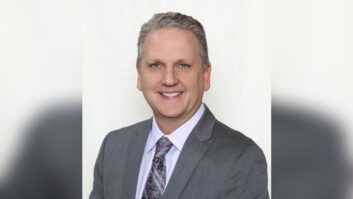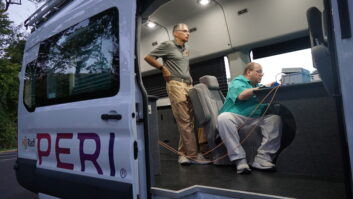
Thomas Osenkowsky
Terrestrial broadcasters are facing increasing competition, not only from fellow broadcasters but from a wave of evolving new technologies. IPod, Blackberry, iPhone, Internet radio, satellite radio and other forms of information and entertainment erode not only listenership but all-important advertiser revenue.
Most broadcasters have Web pages to supplement their primary over-the-air product. This is a good start, embracing instead of rejecting the new technology. Employing new technology as a source of additional revenue is one way to persuade your audience to stay with and not abandon you.
With broadcasters facing declining revenues, the temptation to cut expenses instead of investing in new more diversified content often times prevails. This has the effect of driving away listeners as local news and events coverage gives way to satellite delivered programming. Many stations are automated or voice-tracked, leaving no local announcer at the studio. If the station carries news, it is no doubt from a national source. Some stations simply relay programming from another in a distant city.
Change the rules
It is time for FCC rules to be amended to conform to the realities of modern times.
Specifically, the following should be addressed:
- a. Eliminate main studio rules. Many small stations have few employees. The general manager is out of the studio selling advertising. He/she may also serve the capacities of owner, program director, voice-tracked announcer, production director and sales manager. There are no studio personnel other than telephone voice mail. The studio can literally be a computer in a closet or at the transmitter site with programming being relayed from a distant station, satellite receiver or a local automation system. While this is not an ideal radio station, it is reality in many cases. A toll-free telephone number should suffice for persons wishing to contact a representative of the station, regardless of where programming originates. A mailing address and telephone number can be found on the FCC’s Web site under AM or FM query.
- b. Eliminate public file requirements. Rarely does any member of the public visit a broadcast station to view or copy the Public File. Most people are unaware of its existence or FCC requirement. Persons wishing to know details of ownership can visit the FCC’s Web site to obtain this as well as technical information about each licensed station. Computers are available for use by the public at most libraries. Issues and Programs lists have no practical value. By what means a broadcaster serves its listeners will be determined by the number of listeners and ultimately the amount of revenue, not by a program(s) that is broadcast during low listening hours to satisfy an FCC documentation requirement.
- c. Enhance and simplify EAS. In light of the fact that many stations are unattended, the EAS system should be enhanced to allow authorized local officials to access the system to broadcast alerts that involve public safety. Severe weather and hazmat warnings are two examples. The requirement for weekly tests (RWT) should be eliminated. Stations that simply transmit the required data bursts sound like an audio failure or technical glitch. They send no useful information to the public or to other broadcast stations. Many other FCC rules require monitoring “as often as necessary to ensure compliance.” The same philosophy should be applied to EAS.
- d. Eliminate the FCC requirement for designating a chief operator. Often this technical or contracted person does not have the authority to dismiss or reprimand an employee who may have violated FCC or station rules. The chief operator may not even be authorized to reduce power or cease transmission if a rule violation is discovered. With unattended operation being prevalent in the industry, each station should have a designee with contact information on file with the commission; that person is fully empowered to make all decisions for that station.
The above suggests a radical departure from tradition. That being said, broadcasting has matured into a business environment.
Radio stations do not exist to serve the public interest as envisioned in rules written long ago in a different reality. They are businesses and pay taxes. How many stations open their doors to let someone get a start as an overnight DJ? How many broadcast PSAs, community events, lost pet announcements, etc.? Too many are automated and unattended.
The commission has likewise entered the business world. It collects filing fees, conducts spectrum auctions and levies fines against rule violators. Their rules must change to meet the changes and challenges that have already taken place in the broadcast industry. As much as we may not like or agree with these changes, they are reality.
The author is a consulting engineer and contributor to Radio World. Opinions are his own.
Comment on this or any story. Write to[email protected].












